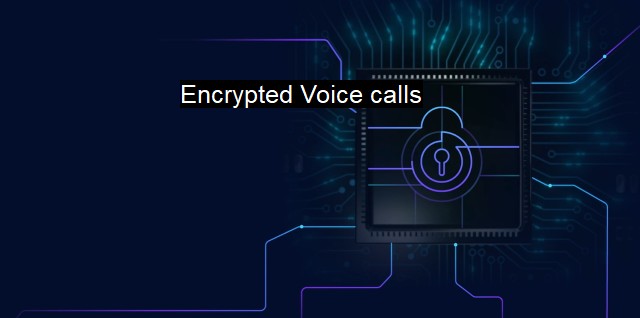What are Encrypted Voice calls?
The Rise of Encrypted Voice Calls: Securing Online Communication from Eavesdropping and Interception with Advanced Encryption Algorithms and Cybersecurity Measures.
In the realm of cybersecurity and antivirus protection, "encrypted voice calls" take on a special place. They serve as a safeguard against unwanted intrusions into personal or confidential conversations, thereby creating a protective layer that helps in maintaining privacy. The concept and application of encrypted voice calls are solidly grounded and understanding this helps one realize how vital they are in the digital age.Encryption, explicably, is a method of transforming clear, understandable information into scrambled, undecipherable data. As for "encrypted voice calls," what this means is, when you are engaging in a voice call, the audio sent from your device, be it a smartphone or a computer, is encoded or masked. This encoded audio can then be decoded and made sense of, only by the person at the other end, who has a special key to unravel the information.
How do encrypted voice calls protect us? Firstly, encrypted voice calls prevent eavesdroppers from listening in on your discussions. Without the key, all they would hear, even if they managed to tap into the call, would be gibberish. This makes encrypted voice calls particularly important in times when confidential matters are discussed over telephone lines or Internet connections. Whether it's secret business negotiations, sensitive military operations, or just personal private chats, encrypted voice calls ensure that the confidentiality of these discussions is kept intact.
When we dive into technical specifics, encrypted voice calls use techniques akin to what we call end-to-end encryption. Under this system, the only people who can access and understand the conversation's content are the participating parties. Each participant holds a pair of keys: a public key known to everyone and a unique private key stored securely on their device. The interlocutors' systems use these keys to encrypt and decrypt the sent and received voice data. Meanwhile, the service provider is mostly blind to the call's content, adding an extra layer of security and privacy.
In the grand scheme of cybersecurity, with escalating threats and devious evolution of malware and spyware, voice call encryption presents not just an advanced safeguard, but a necessity. Encrypted voice calls minimize vulnerabilities that could potentially be exploited during digital communication. They serve as an invaluable antivirus tool, deterring efforts of malicious hackers by rendering their tricks useless.
Aside from protecting conversations against unsolicited eavesdropping, encrypted voice calls also fortify our devices from unwanted malware or viruses. Often, hackers infect devices by sneaking viruses during a voice call, but with encryption, this possibility is significantly thwarted because the encrypted signal is ever-changing and complex, posing a challenge that repels most attempts of intrusion.
It is noteworthy to mention that implementation of encrypted voice calls varies across different platforms. Major internet-based communication service providers such as WhatsApp, Skype, Viber, Zoom, among others, already implemented this advanced security measure. Even though the style of each application differs slightly, the primary mechanics revolving around strong encryption algorithms and key exchanges remain the same.
To sum up, encrypted voice calls provide a significant layer of cybersecurity and, consequently, antivirus measures. They guard against unwanted surveillance, intercept malware, and contribute to an overall safer digital communications environment. As threats evolve and new vulnerabilities come to light, encryption technology must continue to advance, leading the way forward in secure communications. It is recommended that users leverage these gains in encryption technology to protect their audio communications and maintain their digital privacy and security.

Encrypted Voice calls FAQs
What are encrypted voice calls?
Encrypted voice calls refer to phone conversations that are secured with encryption technology, making it difficult for unauthorized individuals to listen in on the conversation or intercept the data transmitted during the call. This technology ensures that the voice data is protected throughout the conversation.How do encrypted voice calls improve cybersecurity?
Encrypted voice calls improve cybersecurity by providing an additional layer of protection to sensitive voice data, making it difficult for cybercriminals or hackers to intercept the conversation or access confidential information exchanged during the call. By securing voice data during transmission, encrypted voice calls can help prevent data breaches or other unauthorized access.Do I need an antivirus software to make encrypted voice calls?
While antivirus software can help protect your device from malware, it is not necessary to have antivirus software to make encrypted voice calls. What you will need is a secure communication application that has end-to-end encryption technology built-in, such as Signal or WhatsApp. These apps use encryption technology to secure both voice and text data, providing a high level of security for your conversations.How do I know if my voice calls are encrypted?
You can check if your voice calls are encrypted by looking for a padlock symbol or a similar indicator in the messaging or calling app you are using. If you see this symbol, it means that the conversation is secured with encryption technology. Additionally, you can research the app's security features to see if it provides end-to-end encryption for voice calls.| | A | | | B | | | C | | | D | | | E | | | F | | | G | | | H | | | I | | | J | | | K | | | L | | | M | |
| | N | | | O | | | P | | | Q | | | R | | | S | | | T | | | U | | | V | | | W | | | X | | | Y | | | Z | |
| | 1 | | | 2 | | | 3 | | | 4 | | | 7 | | | 8 | | |||||||